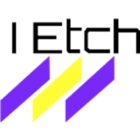Frequently Asked Questions
Here are some answers to the questions we receive most about our electrochemical etching services.
FAQ
What is Electrochemical Etching (also referred to as metal etching)?
Electrochemical etching, as known as electro-etching, is a cost-effective, safe, and non-harmful method for marking metal. Less destructive than hand-stamping, electrochemical etching permanently etches without jeopardizing the integrity of the metal. This is achieved by using a chemical and an electric charge and a stencil.
How does chemical and electrochemical etching work?
Electrochemical etching is a process that uses electrical and chemical reactions in order to etch or mark on metal. When using electrical current through a electrolyte conductor, anodic dissolution takes place.
What are the applications of electrochemical etching?
Many companies will need to permanently mark a tool or part with a serial number, part number, logo, bar code, or even a quote. Almost any metal and metal alloy can undergo electrochemical etching. This includes steel and stainless steels, nickel, copper and aluminium. What makes electrochemical etching so effective is that it works well on hard-to-machine metals, including highly corrosive-resistant metals such as titanium and its alloys. Therefore, this process is used in many industries for marking parts and etching on metal.
What are the advantages and disadvantages of electrochemical etching?
Electrolytic solutions do not generate fumes or toxic gases during the etch . Etching with electricity does not generate toxic gases if you respect the rules of electro-etching with metal plate/same metal salt electrolyte, and a low voltage.
Request More Information
Do you have additiional questions about our electrochemical etching services, or are you looking to request a quote? If you are unsure as to whether or not I Etch is the right solution for you, just click to request a quote or find our contact information including our email and phone number here.
